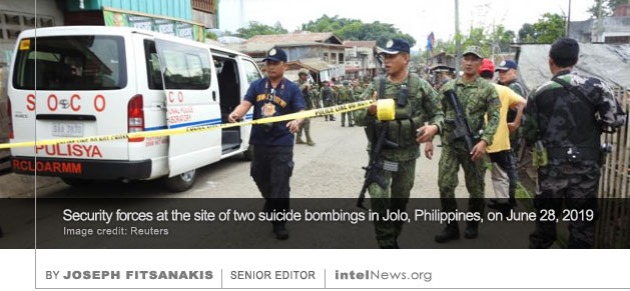ISIS militant was first-ever Filipino suicide bomber, say police officials
July 3, 2019 Leave a comment
 An Islamic State militant who blew himself up in the Philippines last week was probably history’s first-ever Filipino suicide bomber, according to police officials. The man was one of two militants who detonated suicide vests in Indanan, a town in the southern Philippines island of Sulu, on Friday. The twin blasts killed six people, in addition to the two suicide bombers. The target of the attack was a military base that houses the 1st Brigade Combat team of the Philippine Army. The 1,500-strong brigade is leading the counterinsurgency campaign in the country’s heavily Muslim southern regions. Three of the victims were 1st Brigade Combat team soldiers, while three civilians who happened to be walking nearby were also killed.
An Islamic State militant who blew himself up in the Philippines last week was probably history’s first-ever Filipino suicide bomber, according to police officials. The man was one of two militants who detonated suicide vests in Indanan, a town in the southern Philippines island of Sulu, on Friday. The twin blasts killed six people, in addition to the two suicide bombers. The target of the attack was a military base that houses the 1st Brigade Combat team of the Philippine Army. The 1,500-strong brigade is leading the counterinsurgency campaign in the country’s heavily Muslim southern regions. Three of the victims were 1st Brigade Combat team soldiers, while three civilians who happened to be walking nearby were also killed.
The Islamic State —known also as the Islamic State of Iraq and Syria (ISIS)— claimed responsibility for the attack, leading many to speculate that the suicide bombers were not Filipinos, but other Arab nationals. That would fit the pattern of the two previous suicide bombings that have taken place in the history of the Philippines. In July of 2018, a Moroccan ISIS follower drove a van laden with explosives at an army checkpoint on the island of Basilan, killing ten people. And in January of this year, two Indonesian suicide bombers attacked a Roman Catholic congregation on Jolo Island, killing 23 and injuring over 100 churchgoers. All three suicide bombers were members of Abu Sayyaf, a Filipino Salafi jihadist group that pledged allegiance to ISIS in 2014. Moreover, none of the three suicide bombers were native Filipinos; rather they had traveled to the island country in order to carry out terrorist attacks.
This pattern may have changed as of last Friday, however. According to local military officials, a Filipino woman identified the remains of one of the two suicide bombers as belonging to her son. The woman reportedly told authorities that her son was named Norman Lasuca and was 23 years old. She also said that he, like his father, belonged to the Tausūg, a million-strong predominantly Muslim ethnic group that includes many recent converts to Islam.
On Tuesday, several Philippine Army commanders gave a press conference in Sulu, where they discussed the latest information regarding last week’s suicide attacks. One of the speakers, Brigadier-General Edgard Arevalo, said that the purported mother of the suicide bomber had provided DNA samples to the authorities, in order to help positively identify the body. If the DNA tests are positive “then […] we can say conclusively that the person is Filipino”, which will be a first, said Arevalo. A positive result would suggest that the ideology of ISIS may be more appealing to local Filipino youth than has generally been assumed by counterterrorism officials, Arevalo concluded.
► Author: Joseph Fitsanakis | Date: 03 July 2019 | Permalink






